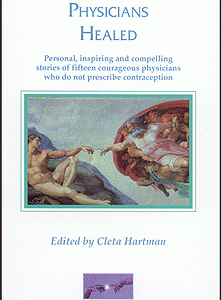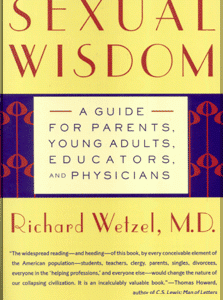Many in the pro-life movement are reluctant to make a connection between contraception and abortion. They insist that these are two very different acts–that there is all the difference in the world between contraception, which prevents a life from coming to be and abortion, which takes a life that has already begun.
With some contraceptives there is not only a link with abortion, there is an identity. Some contraceptives are abortifacients; they work by causing early term abortions. The IUD seems to prevent a fertilized egg–a new little human being- from implanting in the uterine wall. The pill does not always stop ovulation, but sometimes prevents implantation of the growing embryo. And, of course, the new RU-486 pill works altogether by aborting a new fetus, a new baby. Although some in the pro-life movement occasionally speak out against the contraceptives that are abortifacients, most generally steer clear of the issue of contraception.
Contraception creates alleged “need” for abortion
This seems to me to be a mistake. I think that we will not make good progress in creating a society where all new life can be safe, where we truly display a respect for life, where abortion is a terrible memory rather than a terrible reality until we see that there are many significant links between contraception and abortion and we bravely speak this truth. We need to realize that a society in which contraceptives are widely used is going to have a very difficult time keeping free of abortions since the lifestyles and attitudes that contraception fosters create an alleged “need” for abortion.
Planned Parenthood v. Casey
, the recent Supreme Court decision that confirmed Roe v. Wade, stated, “in some critical respects abortion is of the same character as the decision to use contraception… for two decades of economic and social developments, people have organized intimate relationships and made choices that define their views of themselves and their places in society, in reliance on the availability of abortion in the event that contraception should fail.”
The Supreme Court decision has made completely unnecessary any efforts to “expose” what is really behind the attachment of the modern age to abortion. As the Supreme Court candidly states, we need abortion so that we can continue our contraceptive lifestyles. It is not because contraceptives are ineffective that a million and half women a year seek abortions as backups to failed contraceptives. The “intimate relationships” facilitated by contraceptives are what make abortions “necessary.” “Intimate” here is a euphemism and a misleading one at that. Here the word “intimate” means “sexual”; it does not mean “loving and close.” Abortion is most often the result of sexual relationships in which there is little true intimacy and love, in which there is no room for a baby, the natural consequence of sexual intercourse.
Scholars question overpopulation scare
The Supreme Court, though, is unusually candid. Often, ostensibly more noble reasons are given for the enthusiasm for contraception. For instance, many think contraception crucial for controlling what is perceived to be a great population explosion. But most are unaware that there are very serious scholars who question the legitimacy of the scare of overpopulation in most countries on the earth. Scholars such as Ben Wattenberg, Julian Simon, and Jacqueline Kasun maintain that some countries, especially in the west, are facing problems of population replacement and that since we are not reproducing our population we will be in for some very hard economic times. These scholars think that much of the problem even in ostensibly overpopulated areas is political and economic rather than demographic, that is, the problem is not one of too many people, but of an improper distribution of goods.
But the topic here is not overpopulation or the merits of contraception as a means to fight overpopulation. Population control is not the primary source of the enthusiasm of the modern age for contraception. Rather, contraception currently is hailed as the solution to the problems consequent on the sexual revolution; many believe that better contraceptives and more responsible use of contraceptives will reduce the number of unwanted pregnancies and abortions and will prevent to some extent the spread of sexually transmitted diseases.
To support the argument that more responsible use of contraceptives would reduce the number of abortions, some note that most abortions are performed for “contraceptive purposes.” That is, few abortions are had because a woman has been a victim of rape or incest or because a pregnancy would endanger her life, or because she expects to have a handicapped or deformed newborn. Rather, most abortions are had because men and women who do not want a baby are having sexual intercourse and facing pregnancies they did not plan for and do not want. Because their contraceptive failed, or because they failed to use a contraceptive, they then resort to abortion as a backup. Many believe that if we could convince men and women to use contraceptives responsibly we would reduce the number of unwanted pregnancies and thus the number of abortions. Thirty years ago this position might have had some plausibility, but not now. We have lived for about thirty years with a culture permeated with contraceptive use and abortion; no longer can we think that greater access to contraception will reduce the number of abortions. Rather, wherever contraception is more readily available the number of unwanted pregnancies and the number of abortions increases greatly.
Sexual revolution not possible without contraception
The connection between contraception and abortion is primarily this: contraception facilitates the kind of relationships and even the kind of attitudes and moral characters that are likely to lead to abortion. The contraceptive mentality treats sexual intercourse as though it had little natural connection with babies; it thinks of babies as an “accident” of intercourse, as an unwelcome intrusion into a sexual relationship, as a burden. The sexual revolution has no fondness–no room for–the connection between sexual intercourse and babies. The sexual revolution simply was not possible until fairly reliable contraceptives were available.
Far from being a check to the sexual revolution, contraception is the fuel that facilitated the beginning of the sexual revolution and enables it to continue to rage. In the past, many men and women refrained from illicit sexual unions simply because they were not prepared for the responsibilities of parenthood. But once a fairly reliable contraceptive appeared on the scene, this barrier to sex outside the confines of marriage fell. The connection between sex and love also fell quickly; ever since contraception became widely used, there has been much talk of, acceptance of, and practice of casual sex and recreational sex. The deep meaning that is inherent in sexual intercourse has been lost sight of; the willingness to engage in sexual intercourse with another is no longer a result of a deep commitment to another. It no longer bespeaks a willingness to have a child with another and to have all the consequent entanglements with another that babies bring. Contraception helps reduce one’s sexual partner to just a sexual object as it renders sexual intercourse to be without any real commitments.
The casualness with which sexual unions are now entered is accompanied by a casualness and carelessness in the use of contraceptives. Studies show that the women having abortions are very knowledgeable about birth control methods; the great majority–eighty per cent–are experienced contraceptors but they display carelessness and indifference in their use of contraception for a variety of reasons. One researcher reports these reasons: she observes that some have broken up with their sexual partners and believe they will no longer need a contraceptive but they find themselves sexually active anyway.[1] Others dislike the physical exam required for the pill, or dislike the side effects of the pill and some are deterred by what inconvenience or difficulty there is in getting contraceptives. Many unmarried women do not like to think of themselves as sexually active; using contraceptives conflicts with their preferred self-image. The failure to use birth control is a sign that many women are not comfortable with being sexually active. That is, many of the women are engaged in an activity that, for some reason, they do not wish to admit to themselves.
Frequently, aborted pregnancies are planned
One researcher, Kristin Luker, a pro-abortion social scientist, in a book entitled Taking Chances: Abortion and the Decision Not to Contracept attempted to discover why, with contraceptives so widely available, so many women, virtually all knowledgeable about contraception, had unwanted pregnancies and abortions.[2] The conclusions of her studies suggest that it is not simple “carelessness” or “irresponsibility” that lead women to have abortions, but that frequently the pregnancies that are aborted are planned or the result of a calculated risk. She begins by dismissing some of the commonly held views about why women get abortions; she denies that they are usually had by panic-stricken youngsters or that they are had by unmarried women who would otherwise have had illegitimate births. She also maintains that statistics do not show that abortion is an act of final desperation used by poor women and “welfare mothers” or that abortion is often sought by women who have more children than they can handle. What she attempts to discern is what reason women had for not using contraception although they were contraceptively experienced and knew the risks involved in not using contraception.[3] Luker seeks to substantiate in her study that, “unwanted pregnancy is the end result of an informed decision-making process. That pregnancy occurred anyway, for the women in this study, is because most of them were attempting to achieve more diffuse goals than simply preventing pregnancy.”[4]
Luker argues that for these women (who are having non-contracepted sex, but who are not intending to have babies), using contraceptives has certain “costs” and getting pregnant has certain “benefits.” The women make a calculation that the benefits of not using contraception and the benefits of a pregnancy outweigh the risks of getting pregnant and the need to have an abortion. She concurs that many women prefer “spontaneous sex” and do not like thinking of themselves as “sexually active.” She notes that some wondered whether or not they were fertile and thus did not take contraceptives.[5] The “benefits” of a pregnancy for many women were many; pregnancy proves “that one is a woman,”[6] or that one is fertile;[7] it provides an excuse for “forcing a definition in the relationship”;[8] it “forces a woman’s or girl’s parents to deal with her”;[9] it is used as a “psychological organizing technique.”
In the end, almost all of the unmarried women Luker interviewed had the option to marry (and supposedly to complete the pregnancy) but none chose this option. Luker attributes this to unwillingness of women to get married under such conditions, to the disparity between this kind of marriage and their fantasy marriage, and to their belief that they were responsible for the pregnancy, and thus they had no claim on the male’s support.[10] One of her examples is of an unmarried woman who did not like using the pill because it made her gain weight. Coupled with this was her wish to force her boyfriend to openly admit his relationship with her to his parents who rejected her, and possibly to force marriage and thus she decided not to use contraception.[11] Upon becoming pregnant, this woman had an abortion.
“Carelessness” is intentional
Much of this data suggests that there is something deep in our natures that finds the severing of sexual intercourse from love and commitment and babies to be unsatisfactory. As we have seen, women are careless in their use of contraceptives for a variety of reasons, but one reason for their careless use of contraceptives is precisely their desire to engage in meaningful sexual activity rather than in meaningless sexual activity. They want their sexual acts to be more meaningful than a handshake or a meal shared. They are profoundly uncomfortable with using contraceptives for what they do to their bodies and for what they do to their relationships. Often, they desire to have a more committed relationship with the male with whom they are involved; they get pregnant to test his love and commitment. But since the relationship has not been made permanent, since no vows have been taken, they are profoundly ambivalent about any pregnancy that might occur. They are very likely to abort a pregnancy they may even have desired. It may sound farfetched to claim that some women may in some sense “plan” or “desire” the very pregnancies that they abort but this analysis is borne out by studies done by pro-abortion sociologists.
Why do women engage in such self-destructive behavior? Again, a large part of the reason is the incredible emphasis the modern age places on freedom–not on the true freedom we all desire, the freedom to be able to pursue what is good and true, but on a kind of freedom that more closely resembles license–the freedom to do whatever one wants, regardless of what is good and true. We want to be free not to discover what is good and true, but to be free to define what is good and true.
Again, we find explicit verification for our desire to define reality in Planned Parenthood v. Casey which states “at the heart of liberty is the right to define one’s concept of existence, of meaning, of the universe, of the mystery of human life.” Surely everyone is entitled to define his or her “concepts” but when these “concepts” are translated into action, the public has a right to protect others against vicious behavior issuing from those concepts. Some have the “concept” that individuals of certain races or ethnic groups are inferior and are not entitled to equal rights. Surely, they are entitled to that concept, however erroneous it may be, but they are not entitled to impose their concepts on others. Not all concepts are created equal!
We prefer our freedom over what is good
Ultimately, the modern age is shockingly anarchistic in its attitudes. Even in free societies, laws are seen to be largely unwelcome restraints on human freedom; restraints we allow simply so that great harm is not done to individuals–but the fewer restraints we have the better. We have largely lost the sense that laws can put proper restraints on human freedom and be essential to protecting human goods. We see some connection between laws and justice–but largely we prefer laws that protect our freedoms rather than laws that advance our good. For instance, although few maintain that pornography is anything other than harmful for a culture, it is generally tolerated because we prefer our freedom over what is good. After the Enlightenment, the view that man is fundamentally good, and that his freedom to be whatever he wants to be is his most important characteristic, became pervasive. This view was accompanied by a lack of appreciation for the transcendent, by a view of man as just a more highly developed animal. As Nietzsche taught, man ought not to control his passions by his reason, but ought to use his reason to help him to fulfill his passions; to help him to grab whatever happiness he can in this ultimately meaningless universe. This view replaced the Christian vision of man as a guest in God’s universe, a creature flawed by original sin, yet God’s most exalted creation, who through obedience to the laws of nature and of God and through grace, was on a journey to eternal union with God.
Sexual promiscuity increases
By the late sixties and early seventies, the view of the human person as an animal whose passions should govern became firmly entrenched in the attitudes of those who were promoting the sexual revolution. One of the greatest agents and promoters of the sexual revolution has been Planned Parenthood.[12] In the sixties and seventies many of the spokesmen and women for Planned Parenthood unashamedly advocated sex outside of marriage and even promoted promiscuity. Young people were told to abandon the repressive morals of their parents and to engage in free love. They were told that active sexual lives with a number of partners would be psychologically healthy, perfectly normal, and perfectly moral. Now, largely because of the spread of AIDS and the devastations of teenage pregnancy, even Planned Parenthood puts a value on abstinence. Yet they have no confidence that young people can and will abstain from sexual intercourse, so they advocate “safe” sex, “responsible” sex, whereby they mean sexual intercourse wherein a contraceptive is used. Sex educators assume that young people will be engaging in sexual activity outside of marriage (a self-fulfilling assumption in some respects); thus the chief goal of their programs is to get them to use contraception. Planned Parenthood thinks that sex education will reduce the number of pregnancies and thus the number of abortions. But, again, all the studies show that sex education programs inspired by Planned Parenthood lead to more sexual promiscuity, more teen pregnancy, and more abortion.
Young people do not need sex education of the Planned Parenthood type; they need to learn that sexual intercourse can be engaged in responsibly and safely only within marriage. Rather than filling young people’s heads with false notions about freedom, and filling their wallets with condoms, we need to help them see the true meaning of human sexuality. We need to help them learn self-control and self-mastery so that they are not enslaved to their sexual passions. They need to learn that sexual intercourse belongs within marriage, and that with the commitment to marriage comes true freedom; the freedom to give of one’s self completely to another, the freedom to meet one’s responsibilities to one’s children.
There are two cornerstones on which education for sexual responsibility should be built–cornerstones that are both corroded by contraceptive sex. One cornerstone is that sexual intercourse is meant to be the expression of a deep love for another individual, a deep love that leads one to want to give of oneself totally to another. Most individuals hope one day to be in a faithful marriage, to be in a marital relationship with someone one loves deeply and by whom one is loved deeply. One of the major components of that deep love is a promise of faithfulness, that one will give oneself sexually only to one’s spouse. For many it seems odd to speak of the need to be faithful to one’s spouse before marriage, but such is the case. In a sense, one should love one’s spouse before one even meets him or her. One should be preparing to be a good lover, a good spouse, one’s whole life. This means reserving the giving of one’s self sexually until one is married–for in a sense, one’s sexuality belongs to one’s future spouse as much as it does to one’s self. A few generations ago, it was not uncommon for young people to speak of “saving themselves” for marriage. It is a phrase scoffed at today, but one that is nonetheless indicative of a proper understanding of love, sexuality, and marriage. One should prepare one’s self for marriage and one should save one’s self for marriage.
Much damage can be done to the self through sexual intercourse outside of marriage; many come to feel that they have been exploited and that they have exploited others; many experience great alienation and lose the ability to trust another completely. Or the sexual pleasure they are experiencing hinders their ability to get to know the true character of their sexual partner and they make bad judgments about who to marry.[13] We should try to help young people see why they should not take the easy, foolish, and self-destructive path of partaking in meaningless contraceptive sex before marriage.
Contraception severs connection between sex and babies
The other cornerstone for a sex education program should be the refrain that if you are not ready for babies, you are not ready for sexual intercourse, and you are not ready for babies until you are married. Most people want to be good parents; they want to provide for their children and give them good upbringings. Contraception attempts to sever the connection between sexual intercourse and babies; it makes us feel responsible about our sexuality while enabling us to be irresponsible. Individuals born out of wedlock have a much harder start in life; have a much harder time gaining the discipline and strength they need to be responsible adults. Single mothers have very hard lives as they struggle to meet the needs of their children and their own emotional needs as well. Those who abort their babies are often left with devastating psychological scars. The price of out of wedlock pregnancy is high.
Indeed, even within marriage, contraception is destructive; it reduces the meaning of the sexual act; again it takes out the great commitment that is written into the sexual act, the commitment that is inherent in the openness to having children with one’s beloved.
Thus, it should be no surprise that unlike contraceptors, those using methods of natural family planning are highly unlikely to resort to abortion should an unplanned pregnancy occur. Some argue that couples using natural family planning are as closed to having babies as are those that use contraceptives; that they too wish to engage in “babyfree” sexual intercourse. But the crucial difference is that those using NFP are not engaging in an act whose nature they wish to thwart; they are keeping to the principles of sexual responsibility. Their sexual acts remain as open to procreation as nature permits. They are refraining from sexual intercourse when they know they may conceive and engaging in sexual intercourse when they are unable to conceive–precisely because of their desire to be responsible about child-rearing.
Those who abort generally have contracepted
One real telltale difference between contraception and natural family planning is that those who abort generally have contracepted; those who use natural family planning almost never abort. When those using natural family planning get pregnant unintentionally, they fully accept the pregnancy. Generally they practice NFP not to avoid pregnancy entirely, but because they would like to delay a pregnancy. They generally love children and want to have them–so although a pregnancy may be inconvenient at times, it is not disastrous. It is not insignificant that NFP is used only by those who are married; they have the mutual trust and commitment to be able to practice the method.
On the other hand, those using contraception who get pregnant unexpectedly, are generally very angry, since they did everything they could to prevent a pregnancy. Those who are unmarried do face a disaster and abortion seems like a necessity since no permanent commitment has been made between the sexual partners. Those who are married have often planned a life that is not receptive to children and are tempted to abort to sustain the child-free life they have designed. I am not, of course, saying that all those who contracept are likely to abort; I am saying that many more of those who contracept do abort than those who practice natural family planning.
Contraception takes the baby-making element out of sexual intercourse. It makes pregnancy seem like an accident of sexual intercourse rather than the natural consequence that responsible individuals ought to be prepared for. Abortion, then, becomes thinkable as the solution to an unwanted pregnancy. Contraception enables those who are not prepared to care for babies to engage in sexual intercourse; when they become pregnant, they resent the unborn child for intruding itself upon their lives, and they turn to the solution of abortion. It should be no surprise that countries that are permeated by contraceptive sex, fight harder for access to abortion than they do to ensure that all babies can survive both in the womb and out. It is foolish for pro-lifers to think that they can avoid the issues of contraception and sexual irresponsibility and be successful in the fight against abortion. For, as the Supreme Court stated, abortion is “necessary” for those whose intimate relationships are based upon contraceptive sex.
References
1 Mary K Zimmerman, Passage Through Abortion (New York: 1977)
2 Kristin Luker, Taking Chances: Abortion and the Decision Not to Contracept (Berkley: 1975)
3 Luker, 16
4 Luker, 32
5 Luker, 62-63
6 Luker, 65
7 Luker, 68
8 Luker, 70
9 Luker, 71
10 Luker, 123
11 Luker, 83
12 For verification of the claims here made about Planned Parenthood, see George Grant, Grand Illusions: The Legacy of Planned Parenthood (Brentwood, TN: Wolgemuth and Hyatt Publishers, Inc., 1988) and Robert Marshall and Charles Donovan, Blessed are the Barren (San Francisco, CA: Ignatius Press, 1991)
13 For a good pastoral discussion of the evils of premarital sex, see James T. Burtchaell, For Better or Worse (New Jersey, Paulist Press, 1985)
Janet E. Smith is a Visiting Professor of Life Issues at Sacred Heart Seminary in Detroit, the author of Humanae Vitae: A Generation Later (CUA Press, Washington, DC, 1991) and editor of Why Humanae Vitae Was Right: A Reader (San Francisco: Ignatius Press, 1993) and of many articles on ethical and bioethics issues. She speaks nationally and internationally on life issues. Over 400,000 copies of her tape “Contraception: Why Not” have been distributed.







